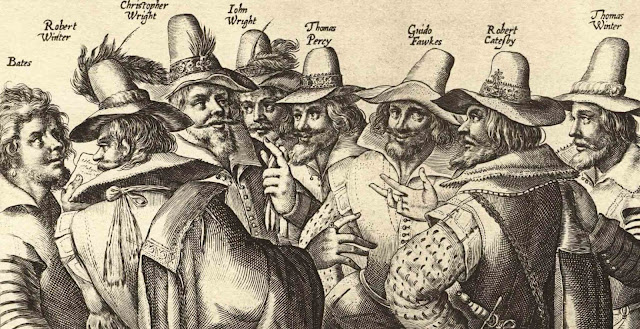Guy Fawkes Night
Its origins could, from a 21st century viewpoint, be thought of as the first act of religious terrorism in England. To understand it, I present a brief (isn) history.
Queen Elizabeth I came to the English throne in 1558 after the fraught, five year reign of her half sister, Mary, a devout Catholic who sought to bring the country back to the Roman Catholic Church that her father, Henry VIII, broke with in 1533. Protestants came under severe persecution at that time. Hundreds of Protestants emigrated and many were burned at the stake as "heretics" for refusing to convert.
The Catholic Mass was banned in 1559, the year after Elizabeth became Queen, and did not become legal again until 1791. Those English Catholics who didn't convert or emigrate were forced to practice their religion in secret and many suffered death, imprisonment and heavy fines like Protestants under Queen Mary's rule. The homes of many leading Catholic families would have had "priest holes", carefully constructed and concealed spaces in fireplaces, under stairways and in attics for Catholic priests to hide in the event of a surprise search of the house if the authorities thought Mass or other Catholic rites were being held there. No surprise then that frustration and anger over this repression eventually resulted in the Gunpowder Plot of 1605.
A group of thirteen dissident Catholics led by Robert Catesby (not Guy Fawkes who was only one of the conspirators) devised a plan to lay thirty-six barrels of gunpowder in the cellar under the House of Parliament. These were to be detonated during the opening of Parliament on November 5th, 1605 when King James I (Mary, Queen of Scots son and heir to the Throne after the childless Queen Elizabeth died in 1603) was there along with most of the leading Protestants and Catholics loyal to the Crown, effectively killing off anyone who could hold the status quo. After the King's death, the plan was to kidnap his daughter, Princess Elizabeth, and place her on the Throne as a puppet Queen provided she converted to Catholicism and married a Catholic noble, thus restoring the country to the rule of the Rome. Pretty far-fetched when you look at it today and even in 1605, it had to have been perceived as absolutely insane by at least some of the people to whom the plan was revealed.
One of the conspirators, Guy (or Guido) Fawkes, was charged with guarding the barrels on the night of November 4th. An anonymous letter, possibly from one of the conspirators who may have had a change of heart, was sent to William Parker, a Catholic noble loyal to the Crown, warning him to stay away from the opening of Parliament. Parker sent the letter onto the King's chief minister, Robert Cecil (his father William had been a chief minister under Elizabeth I) who lost no time in ordering a search of the Houses of Parliament.
In the early hours of November 5th, the search discovered Fawkes with the loaded barrels. He was arrested and tortured during which time he gave the names of his co-conspirators. All thirteen were arrested and sentenced to a traitor's death (a horrible way to die; hanged, drawn and quartered .... the second bit done while the accused was still alive). The sentences were carried out in January of the following year.
The country was genuinely shocked by the news and from then on, bonfires were lit on the night of November 5th to celebrate the King's lucky escape and preservation of peace in the country. Had the plan succeeded it could have led to civil war, which did break out nearly 40 years later, though over a number of issues which included religion.
My husband, who is British, tells me Bonfire Night isn't anything like it was when he was growing up in the 1970s and early 1980s when most people held parties or gatherings at their homes with food, drink and fireworks. The latter seem to be the only bit still done, with both civic and private fireworks displays throughout the country, larger or smaller depending on where you are. There is a push every year to have that stopped, coming mostly from people with complaints ranging from the noise to scared pets to environmental concerns. In this neighborhood you can hear and sometimes see the fireworks being sent up from people's backyards (or "gardens" as they are called in England). I quite like them and am sorry to see another bit of history slowly being consigned to a mention in a book. However, nothing exists in a vacuum so I suppose change is inevitable. Christmas had better watch out then.

Comments
Post a Comment
Thanks for stopping by!